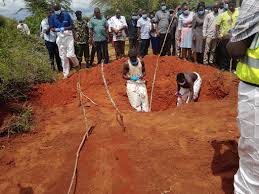
More than 600 people remain unaccounted for as a result of the Shakahola incident, the Kenyan National Commission on Human Rights (KNCHR) has said.
The commission in a statement on Wednesday said it had documented 448 deaths through its comprehensive Mashaka ya Shakahola report.
The commission further notes that only less than 10 per cent of the bodies have been identified and handed over to the families for interment with dignity as per their cultural and religious beliefs," the commission chairperson Roseline Odede said.
KNCHR said while Article 32 of the Constitution guarantees freedom of conscience, religion, thought, belief, and opinion, this right is not absolute.
It can and must be limited when public safety, health, morals, or the fundamental freedoms of others are at risk, KNCHR said.
It said the Shakahola tragedy underscores the catastrophic consequences of failing to enforce these limits.
The commission has called for the full operationalisation of the National Coroners Service Act 2017 to ensure independent and transparent inquiries into deaths of this magnitude.
Additionally, it demanded the release of a legal framework to regulate religious organizations and safeguard the public from extremism.
“This tragedy is a stark reminder that freedom must not be a license for abuse. The State must strike a balance between safeguarding constitutional rights and ensuring public safety,” Odede said.
The KNCHR also flagged resource gaps that hindered effective crisis management.
It urged Parliament and the National Treasury to allocate sufficient funding to agencies tasked with handling Shakahola’s aftermath.
“We cannot afford to let such a tragedy repeat itself. This is a matter of national urgency,” the report declared.
Beyond the legal and regulatory shortcomings, the tragedy exposed vulnerabilities within Kenyan society, particularly the exploitation of the poor and desperate.
The commission called for immediate government action to prevent similar atrocities, emphasising that protecting the sanctity of life is paramount.
It said the Shakahola tragedy serves as a grim wake-up call for systemic reforms, noting that it is not merely a moment for reflection but a national plea for justice, accountability, and the prioritization of humanity in governance.
The Shakahola tragedy shocked the nation, exposing the dark side of religious extremism and the devastating consequences of unchecked practices in the guise of faith.
The tragedy, which unfolded in Kilifi County, highlighted gross violations of human rights under the pretense of religious devotion.
Victims endured unimaginable suffering, many succumbing to starvation and abuse orchestrated by a rogue religious leader.







